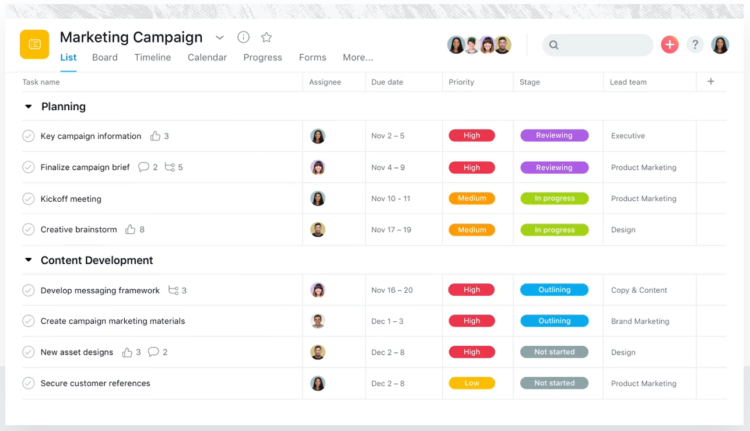8 Most Common Content Marketing Mistakes

Almost 88% of companies run or want to run company blogs. The remaining ones focus on creating e-books, podcasts, newsletters, or infographics. It shouldn’t surprise us any longer – after all, everybody continuously states that content and context are kings. So what should you do to ensure that your business benefits from these two elements as much as possible? What are the 8 most common content marketing mistakes you need to avoid to succeed and prevent wasting your budget? How to make your company’s content a real lead generator?
Content marketing – things that may go wrong
You may think that everybody can write. Obviously, people are more or less talented. But is it really true? It’s 2020, almost every company implements subsequent content marketing activities, so there’s no place for mediocrity. Creating something only because of the fact that you haven’t posted for a while is pointless. So if:
- you create plenty of content but aren’t really able to determine what works and what doesn’t,
- you wonder why your content doesn’t generate leads and doesn’t attract more traffic to the site,
- you’re just planning your marketing strategy and want to find out what to avoid to achieve defined objectives
… keep reading our today’s entry to see if you happen to make the most common content marketing mistakes. Ask yourself the following questions and discuss them with your team during the brainstorming. If you notice that these mistakes are an issue in your business, do your best to eliminate them and make your content king.
1. You don’t know your target group
Each of your marketing activities (even the one connected to content creation) should be preceded by a thorough analysis of user personas. It’s worth mentioning that there may be a few such personas – they perfectly illustrate your clients, customers, objectives, values, beliefs, needs, and problems. Devising your user personas should be the real starting point. After all, you need to know the people you write to and the reason you do it.
Helpful questions:
- Am I able to describe my target group? Who is my dream customer?
- What are my recipients’ needs and expectations that can be satisfied by my products/services?
- How old are my recipients? What devices do they use? What is their favorite method of absorbing knowledge?
2. You haven’t determined your objectives
Content marketing activities should aim at achieving specific goals linked to your business objectives. Do you want to improve your SEO results and Google positions? What about increasing the number of impressions and web sessions? Or maybe you prefer to focus more on leads and completed contact forms? Determine why you want to work on your content and only then decide what to do and how to do it to effectively achieve your goals.
Helpful questions:
- Why do I actually create content? What do I expect from my publications? What changes do I want?
- Is it possible to define my objectives with specific numbers and achieve them at a specific time?
- How can quality content support my business?
3. You aren’t consistent
One new post a month, mailing every six months, or new blog entry when “somebody finally finds time to do it” isn’t the best definition of content marketing. Content marketing requires a great deal of patience and consistency. Eating an apple once a month doesn’t make you a fitness guru or a healthy diet specialist. A blog post, newsletter, and social media post at least once a week is a bare minimum and you (or your employee) need to devote a few working hours to perform these tasks.
Helpful questions:
- What can help me keep my activities regular?
- Who can help me with content marketing if I don’t have time for that? Copywriter, assistant, or outsourcing agency?
- What is the objective of my content marketing activities? Does it motivate me to keep performing subsequent activities?
4. You don’t fulfill your content marketing plan
A content plan, meaning the schedule of the upcoming social media and website activities, will help you be more disciplined. Content sprints – team meetings and brainstorming during which you’ll be able to devise and discuss ideas and actions that should be implemented will certainly facilitate the process of creating content in advance.
Helpful questions:
- What tools are the best to create a content marketing plan that will be accessible to all employees? Is it advisable to use online or offline tools?
- Who will be responsible for ensuring that the company follows its content marketing strategy?
- How often will you and your team need to meet for content sprints?
- For how long in advance are you able to plan your publications?

5. You don’t use diversified forms of content
Content marketing isn’t only about blogging. Each of us prefers different forms of content – infographics on social media, newsletters to read during drinking your morning coffee, a podcast to listen to in the car or on a bike on the way to work, and many, many more. It doesn’t necessarily mean that you’re supposed to create 43 different forms of content a week. A blog post once a week, an infographic highlighting the most important points of the article, and a podcast summarizing blog posts from a given month will be more than enough. Benefit from content recycling – process the same content in several different ways.
Helpful questions:
- How can I use content recycling in my marketing activities to reach numerous potential customers through different channels?
- What are my strongest assets? Is it article writing, video recording, graphic, or ebook creation? Do I need help with anything?
6. You don’t make your content SEO-friendly
You create attractive and quality content but don’t pay attention to SEO rules and requirements of Google algorithms? If so, there’s a huge probability that your texts will simply get lost in the magnitude of the online world. Being familiar with the principles of SEO copywriting (to reach real recipients) and web writing (to satisfy Google robots) is the key to effective content marketing.
Helpful questions:
- Do I pay attention to appropriate text and header structure, meta descriptions, or internal and external linking when creating my content?
- Can I find a happy medium between the expectations of my readers, Google robots, and activities that support the SEO process of my website?
7. You don’t promote your content
You’ve written quality and SEO-friendly blog post or article, you did your best to create an entry which is several thousand characters long and… nothing. Maybe you haven’t promoted your content sufficiently? Take advantage of the possibilities offered by newsletters, your brand’s social media profiles, and various Facebook or LinkedIn groups.
Helpful questions:
- Do I promote my content? What methods do I use?
- How can I reach my target group?
8. You don’t analyze the results of your content marketing activities
All your content marketing activities should be topped out with a thorough analysis of the obtained results. Apart from everyday copywriting tasks performed in Google Docs or Word, you should regularly use tools like Google Analytics or Search Console.
Content marketing mistakes – time for implementation
Unfortunately, reading about the mistakes isn’t enough. Obviously it would be perfect if we were able to learn only from someone else’s mishaps. Try out the solutions indicated in this article. Save it in your tabs and return to it in a few weeks’ time. Let us know in the comments below if you see any improvements in your GA results or readers’ reviews. We keep our fingers crossed and hope that your increasingly better content will allow you to quickly reach top Google positions. Good luck!



